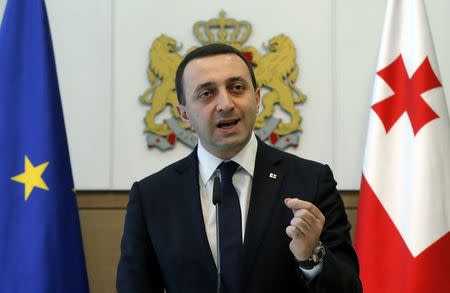Georgia coalition in crisis as party, foreign minister quit

By Margarita Antidze TBILISI (Reuters) - Georgia's foreign minister quit on Wednesday and one of six parties in the ruling coalition pulled out, depriving it of a parliamentary majority in a rift over the pace of integration with the West. Foreign Minister Maya Panjikidze, who cited threats to Georgia's pro-Western course, and a junior minister resigned following the dismissal of the former Soviet republic's pro-Western defense minister by Prime Minister Irakly Garibashvili. Garibashvili said he remained committed to closer Western ties - a trend viewed with suspicion by Russia which regards ex-Soviet republics still as within its sphere of interest. Georgia blundered into a five-day war with Russia in 2008 and former Soviet Ukraine's drive for closer integration with the West has brought it into conflict with Moscow. Kiev is grappling with an uprising by pro-Russian rebels in its eastern territories. For Georgia the balance between ties with Russia, an important trading partner, and the West remain sensitive. The defection of the Free Democrats, led by sacked minister Irakly Alasania, from the Georgian Dream coalition, increases political instability in the country of 4.5 million crossed by pipelines carrying Caspian oil and gas from Azerbaijan to Europe. "We have left the coalition," Alasania declared after his party met other leaders of the coalition to discuss the crisis. The Free Democrats have 10 of the coalition's 83 seats in the 150-seat assembly. The coalition will now need the backing of independent deputies for a majority but a confidence vote must be called only if seven or more of the 20 cabinet members are replaced. The tensions in the coalition highlight Georgia's difficulties trying to pursue its goals of joining NATO and the European Union without antagonizing Moscow. Alasania had irked Garibashvili by saying the arrests of several officials in his ministry were politically motivated and meant to undermine supporters of better relations with the West. "Georgia's Euro-Atlantic integration is the most important thing for me and my team," Panjikidze told a news conference at which she said four deputy ministers were quitting with her. "My team and I cannot hide the threats that our country faces now," she said, announcing she was quitting Georgian Dream. Alexy Petriashvili, a member of the Free Democrats, also resigned as state minister for European and Euro-Atlantic integration. In Washington, the State Department said it "noted with concern" Alasania's dismissal and the subsequent ministers' resignations. "We call upon the Georgian government to take steps to dispel perceptions that the judicial system is being used for political purposes, and to demonstrate its commitment to our shared democratic values," it added in a statement. NO CHANGE IN POLICY Garibashvili said suggestions by Alasania and his allies that the country's pro-Western foreign policy was under threat were unfounded. "Our foreign policy course is unchanged. It is irreversible," he said in a statement. "Those ridiculous and naive statements of course will have no effect at all." Garibashvili said Mindia Janelidze, secretary of a council overseeing security, will replace Alasania as defense minister and said his critics' statements and actions amounted to sabotage that could harm Georgia's interests. President Georgy Margvelashvili said the crisis posed "a threat to the efficient functioning" of state institutions and to Georgia's quest for Euro-Atlantic integration. Margvelashvili urged the government to discuss implementation of the association agreement with the European Union as well as a cooperation package with NATO that had been drafted by the Alliance at a summit in September. "A change of Georgia's European course is impossible, but at the same time we should ask the question how efficient our service is in implementation of our people's choice." Western countries have expressed concern that the Georgian Dream government, first formed under billionaire Bidzina Ivanishvili in 2012, has persecuted political opponents and used selective justice against them. Dozens of ex-officials, including a former prime minister, defense and interior minister and the mayor of the capital Tbilisi, have been arrested on charges such as abuse of power and corruption since the coalition came to power. (Editing by Ralph Boulton, Sandra Maler and Lisa Shumaker)

 Yahoo News
Yahoo News 